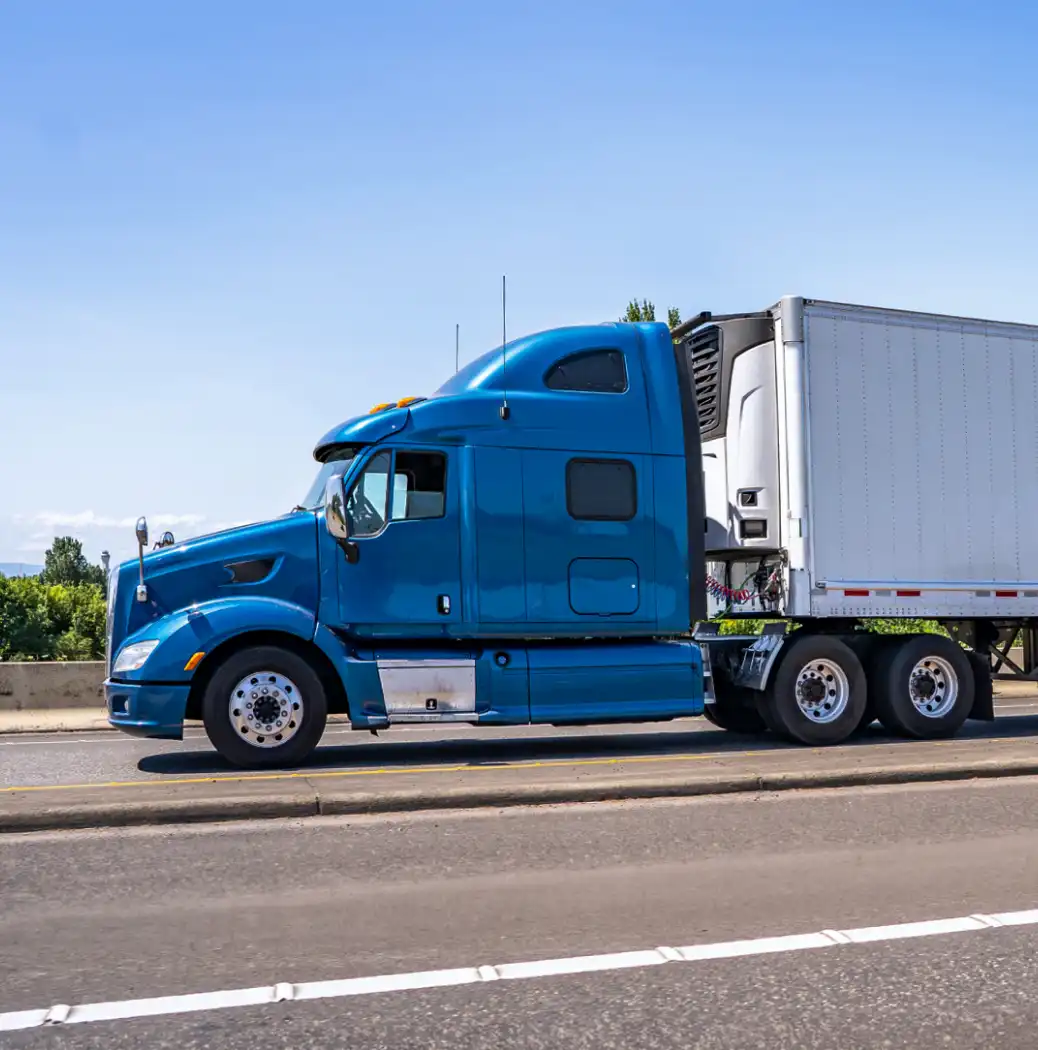As the name implies, a food-grade trailer is designed specifically for transporting dry or liquid food for humans and animals. These specialized trailers carry everything from chocolate to bottles of wine to your favorite retail stores. However, not every trailer transporting food qualifies as a food-grade trailer. To earn that designation, it must meet the strict requirements set by the Food and Drug Administration and include specific equipment. Let’s explore what makes an ideal food-grade trailer and how logistics providers like OnTime Express ensure fast and safe food delivery.
Food-Grade Trailer Types
Food-grade trailers come in various types, including dry vans, refrigerated trailers, and tanker trailers, each with distinct features to ensure food safety and quality.
Dry Van Trailers
Dry vans are the most basic type of food-grade trailer that is used to transport non-perishable food items like canned goods, dry cereals, and packaged snacks. These trailers offer a sealed environment to prevent contamination and damage from external elements. While they lack temperature control, they do a great job transporting goods that don’t require refrigeration.

Refrigerated Trailers (Reefers)
Refrigerated trailers, or reefers, are designed for transporting perishable food like dairy, frozen foods, and fresh produce that must remain at a constant temperature. Equipped with climate-control systems, reefers maintain the required temperature throughout the journey, keeping the food fresh until it reaches its destination.
Tanker Trailers
Tanker trailers are built to transport bulk liquid food items, such as milk, cooking oils, and juices. These trailers are designed with stainless steel interiors and are often insulated to maintain specific temperatures. Cleaning procedures for tanker trailers are highly regulated to prevent cross-contamination between different loads.
The Food and Drug Administration Requirements
The Food and Drug Administration (FDA) has established strict regulations for food-grade trailers to ensure the safe transportation of food for both human and animal consumption. These regulations are in place to prevent contamination and ensure that food products remain safe from the point of origin to their final destination.
Sanitation and Cleaning Protocols:
Food-grade trailers must be thoroughly cleaned and sanitized before and after each load to avoid cross-contamination. The cleaning procedures must adhere to specific guidelines depending on whether the trailer is carrying dry goods or liquids. For example, tanker trailers transporting liquids must undergo rigorous cleaning to remove any residue from the previous load.
Temperature Control:
The FDA mandates that temperature-controlled trailers, such as reefers, maintain strict temperature guidelines throughout transportation. Compliance with FDA guidelines is especially important for perishable items like meat, dairy, and produce.
Material and Equipment Standards:
Trailers must be constructed from non-toxic, food-safe materials that are resistant to corrosion and contamination. FDA material standards ensure that no harmful substances come into contact with the food being transported.
Documentation and Record-Keeping:
Logistics companies are required to maintain accurate documentation, such as cleaning records, temperature logs, and proof of compliance with FDA regulations. These records must be readily available for inspection at any time.

The Recipe of an Ideal Food-Grade Trailer
Building the perfect food-grade trailer requires incorporating key features that ensure food safety, quality, and efficiency during transportation. At OnTime Express, these features are standard for our food-grade trailers, allowing us to deliver your food products in perfect condition.
- Food-Safe Interior Materials
The ideal food-grade trailer must be constructed with non-toxic, food-safe materials to avoid contamination. Stainless steel is often used for its durability, corrosion resistance, and ease of cleaning. For liquid food transport, such as juices or oils, tanker trailers lined with stainless steel ensure that the product remains pure and uncontaminated. - Seamless and Easy-to-Clean Design
The interior of a food-grade trailer must have a smooth, seamless design to prevent any buildup of food particles or bacteria. The absence of cracks or crevices makes cleaning more efficient, ensuring that no contaminants remain between loads, which guarantees that all food products are transported in a sterile environment. - Temperature Control Capabilities
An ideal food-grade trailer, especially refrigerated, must be equipped with advanced temperature control systems that can be adjusted and monitored remotely. These systems maintain the correct temperature and provide real-time data to ensure compliance throughout the entire journey. - Insulation for Efficiency
High-quality insulation ensures that food products are kept at the right temperature, whether in dry or refrigerated trailers. Proper insulation helps maintain temperature consistency, even in extreme weather conditions, minimizing temperature fluctuations and reducing energy losses during transportation. - Secure Loading and Unloading Systems
A secure, hygienic loading and unloading system minimizes the risk of contamination during these processes. Food-grade trailers should also have well-maintained doors and seals to ensure no external contaminants can enter during transport.
OnTime Express’ Commitment to Providing Efficient Food-Grade Services
At OnTime Express, we believe that every detail matters when it comes to food-grade transportation. We go beyond industry requirements, ensuring our food-grade trailers are equipped with the latest technology to maintain safety and quality throughout the supply chain. From precise temperature control on our reefers to insulation and sanitation protocols, we ensure nothing is left to chance.
Our dedication to exceeding customer expectations is a driving force behind our operations. We have gone the extra mile to perfect every aspect of food transport to consistently deliver your products on time and always in mint condition.
